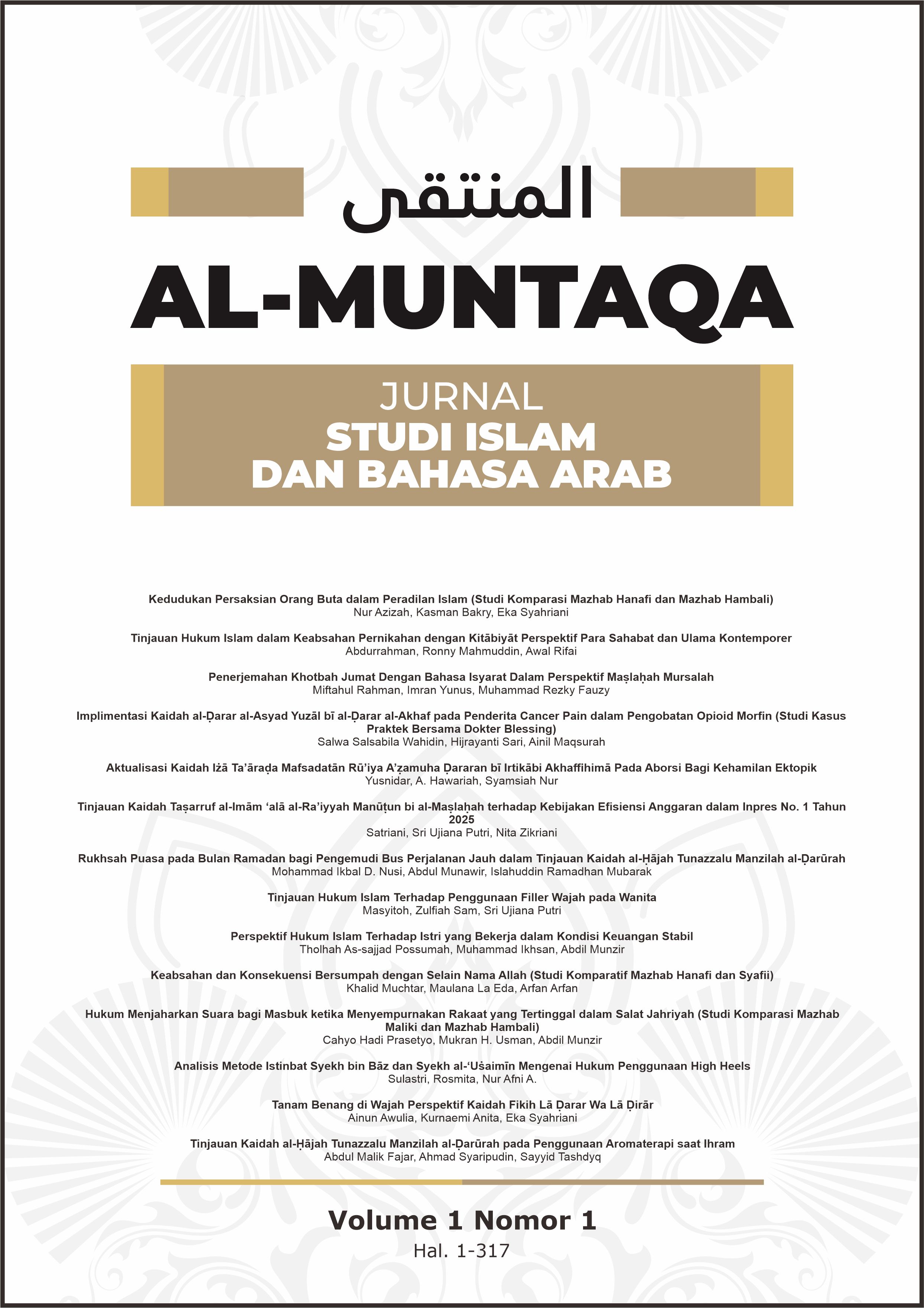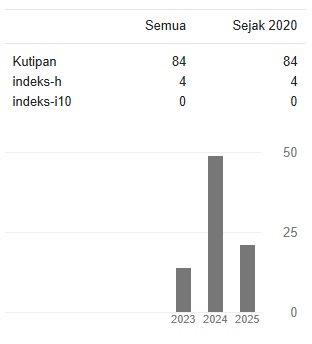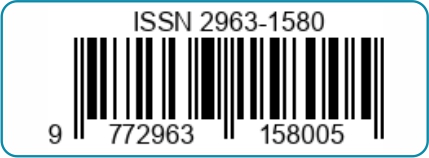Implimentasi Kaidah al-Ḍarar al-Asyad Yuzāl bī al-Ḍarar al-Akhaf pada Penderita Cancer Pain dalam Pengobatan Opioid Morfin (Studi Kasus Praktek Bersama Dokter Blessing)
The Implementation of the Legal Maxim al-Ḍarar al-Asyad Yuzāl bi al-Ḍarar al-Akhaf in Cancer Pain Patients Undergoing Morphine Opioid Therapy (A Case Study at the Blessing Doctors Joint Practice)
DOI:
https://doi.org/10.36701/muntaqa.v1i1.2392Keywords:
cancer pain, morphine, opioid analgesics, islamic legal maxim, medical ethicsAbstract
Cancer pain is one of the chronic pains often experienced by cancer patients and raises ethical and medical dilemmas regarding the use of opioid analgesics such as morphine. Morphine is effective in alleviating severe pain, but its serious side effects can reduce the quality of life for patients. In facing ethical and normative limitations, the application of the principle of al-Ḍarar al-Asyad yuzāl bi al-Ḍarar al-Akhaf becomes crucial to assess the benefits and harms of opioid use in cancer pain patients. The research problem formulationit includes: describing the severity of Cortical cancer patients'Rand pain requiring morphine, analysing the medical decision-making spection of morphine administration while considering risks and benefits, and evaluating the application of the principle of al-Ḍarar al-Asyad yuzāl bi al-Ḍarar al-Akhaf in clinical ethos at the Blessing Doctor's Joint Practice. The research method uses a normative qualitative case study approach, with data collected through participatory observation, in-depth interviews with doctors and patients, as well as documentation, and then analysed comparatively and deductively-inductively. The research results show that morphine is administered to advanced-stage patients under strict supervision and is considered a lesser harm compared to unbearable pain. This principle is comprehensively applied in clinical decisions, where ethical aspects, religious values, and patient rights serve as the foundation of therapy. Research recommends the integration of fiqh considerations and modern medical ethics in cancer pain management, as well as strengthening multidisciplinary studies in clinical policies based on maqāṣid al-Syarī‘ah.
Downloads
References
Al-Qur’an al-Karīm
Buku
Al-Bahiyy, Muḥammad. Fiqh al-Ḍawābiṭ wa al-Maqāṣid. Beirut, Lebanon: Dār al-Kutub al-‘Ilmiyyah.
Brunton, L. L., R. Hilal-Dandan, dan B. C. Knollmann. Goodman & Gilman's: The Pharmacological Basis of Therapeutics. Edisi ke-13. New York: McGraw Hill, 2018.
Al-Bukhārī, Muḥammad ibn Ismā‘īl Abū ‘Abdullāh. Ṣaḥīḥ al-Bukhārī, Kitāb al-Ṭibb, Juz 7. Cet. 1, 1422 H/2001.
Kementerian Agama RI. Al-Qur’an dan Terjemahnya. Bandung: PT. al-Qosbah Karya Indonesia, 2022.
Al-Qarāfī, Aḥmad ibn Idrīs. Al-Furūq, Jilid 4. Beirut: ‘Alam al-Kutub, 1434 H / 2013 M.
Al-Qazwīnī, Muḥammad ibn Yazīd ibn Mājah. Sunan ibn Mājah, no. 2340; Aḥmad ibn Ḥanbal. Al-Musnad, Juz 5. Cet. Dār al-Fikr, 1414 H/1994 M.
Smith, J. Understanding Cancer Pain. Cet. I; London: Health Publications, 1442 H/2020 M.
Al-Suyūṭī, Jalāl al-Dīn. Al-Asybah wa al-Naẓāʾir. Beirut, Lebanon: Dār al-Kutub al-‘Ilmiyyah, 2003.
Al-Zuhailī, Wahbah. Uṣūl al-Fiqh al-Islāmī. Damaskus: Dār al-Fikr, 1989.
Jurnal
Cleeland, C. S., dan K. L. Syrjala. “Assessment and Management of Pain in Cancer: Clinical Guidelines.” Journal of Clinical Oncology 32, no. 16 (2014): 1637–1643.
Guest, G., A. Bunce, dan L. Johnson. “How Many Interviews Are Enough? An Experiment with Data Saturation and Variability.” Field Methods 18 (2006): 83–90.
Gregory, G. P., dan M. T. Smith. “The Safety Profile of Morphine in Cancer pain Management.” Journal of Supportive Oncology 17, no. 3 (2019).
Hirsh, J. M., dan T. W. Vanderah. “Adverse Effects Associated with Long-Term Morphine Use in Cancer Therapy.” Journal of Pain Management 14, no. 1 (2020): 13–21.
Johnson, R., dkk. “Pain Management in Cancer Patients: Recent Advances and Research.” Journal of Pain Research no. 12 (2021): h. 235–243.
Thompson, J., dan R. Greenfeld. “Cancer pain Management: The Evolving Landscape of Innovative Therapies and Technologies.” Journal of Pain and Symptom Management 63, no. 4 (2022): h. 567–578.
Trescot, A. M., et al. “Opioid Pharmacology.” Pain Physician 13, no. 2 (2008): h. 133–153.
Wiffen, P. J., B. Wee, dan S. Derry. “Principles of Islamic Bioethics in Pain Management: Analyzing Case Studies from Islamic and Medical Perspectives.” Journal of Pain and Symptom Management (2019).
Winarsih, T., R. N. Yunita, T. Nuraini, dan N. P. Sari. “Karakteristik dan Penatalaksanaan Nyeri Pada Pasien Kanker di RSUP Dr. Sardjito Yogyakarta.” Jurnal Keperawatan Indonesia 20, no. 1 (2017): 52–61.
Website
World Health Organization. “Cancer pain Relief and Palliative Care.” WHO. Diakses 26 Desember 2024. https://www.who.int/publications/i/item/cancer-pain-reliev-and-palliative-care-report-of-a-who-expert-committe.
Downloads
Published
Issue
Section
License
Copyright (c) 2025 Salwa Salsabila Wahidin, Hijrayanti Sari, Ainil Maqsurah

This work is licensed under a Creative Commons Attribution-NonCommercial-ShareAlike 4.0 International License.










